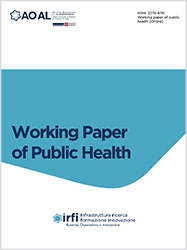Brief strategic psychotherapy and narrative medicine: an integrated model
Corrective emotional experiences in the hospital setting in two clinical cases of hypochondriacal disorder and post-traumatic stress disorder

Accepted: 9 May 2022
Supplementary Materials (Italiano): 0
All claims expressed in this article are solely those of the authors and do not necessarily represent those of their affiliated organizations, or those of the publisher, the editors and the reviewers. Any product that may be evaluated in this article or claim that may be made by its manufacturer is not guaranteed or endorsed by the publisher.
OBJECTIVES
Comparative analysis of the aspects of interconnection and differentiation/protocol integration with narrative medicine.
Empirical evaluation of the effectiveness and efficiency of strategic narrative techniques on individual cases in terms of the development of corrective emotional experiences aimed at reducing/remitting the symptomatic picture and raising the level of psychophysical and socio-relational well-being of the patients treated.
METHODOLOGY
Action research, operational diagnosis, narrative techniques of the reference strategic intervention protocols.
RESULTS
On the basis of the applied protocols, a complete remission of symptoms was observed in the psychopathological areas treated, with an increase in coping functions and adaptive modalities in the treated cases of hypochondriacal disorder and post-traumatic stress disorder, attested from follow-up to 6, 12 and 24 months after the end of the treatment.
CONCLUSIONS
In the two cases studied, the use of strategic narrative techniques, with their peculiar characterizations, appears to be effective as a tool for inducing corrective emotional experiences necessary for change and improvement in the psychopathological structure of patients and their possible application, in the context of principals of health psychology, in integration-continuity with narrative medicine.
Maconi A, Lombardi R, Dacquino M. Medicina e altre scienze: Medical Humanities. Working Paper of Public Health. 2019;7. DOI: https://doi.org/10.4081/wpph.2019.9216
World Health Organization. Constitution of the World Health Organization. International Health Conference, New York, USA, 1946.
Barbierato A, Baretto E, Pepoli A. Esperienza in medicina narrativa nell’ospedale di Alessandria con il personale dell’Ematologia e della Neurooncologia. Working Paper of Public Health. 2014;2. DOI: https://doi.org/10.4081/wpph.2014.6721
Ruiz L, Ferrandi D, Bolgeo T, et al. La stanza della scrittura: scrivere aiuta la guarigione. Working Paper of Public Health. 2016;14.
Barbierato A, Depaoli L, Pepoli A. La “riscrittura” del campo emotivo tra medico e paziente. Interventi di medicina narrativa in ospedale. Roma: Aracne editrice. 2019. 88 pp.
Bertolini G. Diventare medici. Il problema della conoscenza in medicina e nella formazione del medico. Milano: Guerini editore. 1995. 184 pp.
Bertini M. Psicologia della Salute. Milano: Raffaello Cortina editore. 2012. 390 pp.
Charon R (traduzione a cura di Christian Delorenzo). Medicina narrativa. Onorare le storie dei pazienti. Milano: Raffaello Cortina editore. 2006. 316 pp.
Nardone G. Psicosi e ipocondria. Roma: Paesi editore. 2020. 72 pp.
Watzlawick P. Il linguaggio del cambiamento. Elementi di comunicazione terapeutica. Milano: Feltrinelli editore. 1980. 176 pp.
Watzlawick P, Nardone G. Terapia breve strategica. Milano: Raffello Cortina editore. 1997. 230 pp.
Nardone G, Salvini A. Dizionario Internazionale di Psicoterapia. Milano: Garzanti editore. 2013. 700 pp.
Nardone G, Balbi E. Solcare il mare all’insaputa del cielo. Milano: Ponte alle Grazie editore. 2008. 182 pp.
Pennebaker JW, Smyth JM. Il potere della scrittura. Milano: Tecniche Nuove editore. 2017. 250 pp.
Gabbard G. A Neurobiologically informed perspective on Psychotherapy. The British Journal of Psychiatry. 2000;177:117-122. DOI: https://doi.org/10.1192/bjp.177.2.117
LeDoux J. Il sé sinaptico. Come il nostro cervello ci fa diventare quelli che siamo. Milano: Raffaello Cortina editore. 2002. 570 pp.
LeDoux J. Ansia. Milano: Raffaello Cortina editore. 2016. 629 pp.
Dennet DC. Dai batteri a Bach. Come evolve la mente. Milano: Raffaello Cortina editore. 2018. 551 pp.
Nardone G. Emozioni. Istruzioni per l’uso. Milano: Ponte alle Grazie editore. 2019. 117 pp.
Jung CG. Ricordi, sogni, riflessioni. Roma: Rizzoli editore. 1998. 508 pp.
Nardone G. Paura, panico, fobie: la terapia in tempi brevi. Milano: Ponte alle Grazie editore. 1993. 300 pp.
Alexander F. (1946) L’esperienza emozionale correttiva. Psicoterapia e Scienze Umane. 1993, XXVII, 2: 85-101.
Nardone G, Milanese R. Il cambiamento strategico. Milano: Ponte alle Grazie editore. 2018. 142 pp.
Van der Kolk B. Il corpo accusa il colpo. Mente, corpo e cervello nell’elaborazione delle memorie traumatiche, Milano: Raffaello Cortina editore. 2014. 501 pp.
Cagnoni F, Milanese R. Cambiare il passato. Superare le esperienze traumatiche con la terapia strategica. Milano: Ponte alle Grazie editore. 2009. 236 pp.
Sterpone R, Manfredi V, Cassinari A, et al. Psychological effects of COVID-19 outbreak in hospital workers during the Italian third phase. Working Paper of Public Health. 2021;9. DOI: https://doi.org/10.4081/wpph.2021.9457
Nardone G, Cagnoni F, Milanese R. La mente ferita. Attraversare il dolore per superarlo. Milano: Ponte alle Grazie editore. 2021.
Jullien F. Il gioco dell’esistenza. De-coincidenza e libertà. Milano: Feltrinelli editore. 2019. 128 pp.
Von Foerster H. Ethics and second-order Cybernetics. 1991; ESF; Paris, France; pp.44-55.
Bartoletti A, Nardone G. La paura delle malattie. Milano: Ponte alle Grazie editore. 2018. 331 pp.
Nardone G, Speciani L. Mangia, muoviti, ama. Milano: Ponte alle Grazie editore. 2015. 288 pp.
Supporting Agencies
NonePAGEPress has chosen to apply the Creative Commons Attribution NonCommercial 4.0 International License (CC BY-NC 4.0) to all manuscripts to be published.

 https://doi.org/10.4081/wpph.2022.9497
https://doi.org/10.4081/wpph.2022.9497




